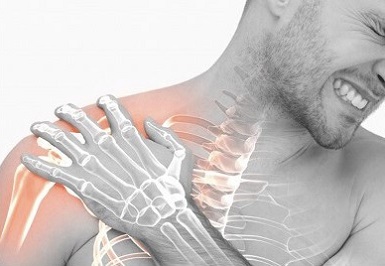Nikhil Prasad Fact checked by:Thailand Medical News Team Jul 08, 2024 1 year, 5 months, 2 weeks, 6 days, 2 hours, 20 minutes ago
COVID-19 News: What is Parsonage Turner Syndrome?
Parsonage Turner Syndrome (PTS), also known as neuralgic amyotrophy, is a rare and painful condition that affects the nerves controlling the muscles in your shoulders, arms, and chest. It can cause sudden and severe pain, followed by weakness and muscle wasting. This condition often strikes out of the blue, but it's sometimes triggered by infections, vaccinations, or even minor injuries.
 Unknown To Many Including Doctors, COVID-19 Causes Parsonage Turner Syndrome
COVID-19 and Parsonage Turner Syndrome
Unknown To Many Including Doctors, COVID-19 Causes Parsonage Turner Syndrome
COVID-19 and Parsonage Turner Syndrome
Recently, Greek researchers have discovered a connection between COVID-19 and the onset of PTS. This
COVID-19 News report explores this surprising link and sheds light on how the virus might be triggering this painful syndrome.
The Research
A group of researchers from various prestigious institutions, including the Department of Orthopaedics at Laikon Hospital in Athens, the 1st Department of Orthopaedic Surgery at National and Kapodistrian University of Athens, Attikon Hospital, and the Department of Allergy and Immunology at the same university, came together to investigate this phenomenon. They reviewed 26 documented cases of PTS that followed SARS-CoV-2 infection.
Symptoms of Parsonage Turner Syndrome
The hallmark of Parsonage Turner Syndrome (PTS) is sudden, intense pain in the shoulder or arm, often waking people from sleep. This pain usually lasts for several days or weeks and can be debilitating. As the pain subsides, it is followed by muscle weakness and wasting, making it difficult to perform everyday tasks.
How COVID-19 is Linked
In the reviewed cases, many patients developed Parsonage Turner Syndrome (PTS) after recovering from COVID-19. This suggests that the virus might trigger an immune response that attacks the nerves, leading to the development of PTS. This connection is particularly concerning given the widespread nature of COVID-19 and the significant impact PTS can have on a person's quality of life.
Diagnosing Parsonage Turner Syndrome (PTS)
Diagnosing Parsonage Turner Syndrome (PTS) can be challenging. Doctors usually rely on the patient's medical history and symptoms, followed by tests like electromyography (EMG) and nerve conduction studies (NCS) to confirm the diagnosis. These tests help assess the extent of nerve damage and muscle involvement.
Treatment Options
There is no specific cure for Parsonage Turner Syndrome (PTS), but treatment focuses on managing pain and supporting nerve recovery. Non-steroidal anti-inflammatory drugs (NSAIDs), corticosteroids, and physical therapy are commonly used to relieve pain and improve function. In some cases, medications like gabapentin or pregabalin, which are used to treat nerve pain, may be prescribed.
Case Presentation
gt;
One notable case involved a 65-year-old man who developed PTS six weeks after receiving the Pfizer/BioNTech COVID-19 vaccine. He experienced severe shoulder pain and muscle weakness, which did not improve with standard treatments. EMG and MRI confirmed the diagnosis of PTS, and he eventually found relief through corticosteroid treatment and intensive physiotherapy.
The Importance of Awareness
It's crucial for healthcare providers to be aware of the potential link between COVID-19 and PTS. Early recognition and treatment can help manage symptoms and improve outcomes for patients. As the world continues to grapple with the pandemic, understanding and addressing the long-term effects of COVID-19, such as PTS, becomes increasingly important.
Future Research
The researchers emphasized the need for standardized diagnostic methods and comprehensive evaluations to accurately diagnose and manage PTS. Future research should focus on developing consistent evaluation methods and exploring the underlying mechanisms that link COVID-19 to PTS.
Conclusion
Parsonage Turner Syndrome is a painful and debilitating condition that can significantly impact a person's life. The discovery of its association with COVID-19 adds another layer of complexity to the ongoing pandemic. Healthcare providers and researchers must work together to understand and address this connection, ensuring that patients receive timely and effective treatment.
The study findings were published in the peer-reviewed journal: Cureus.
https://www.cureus.com/articles/251569-parsonage-turner-syndrome-and-sars-cov-2-infection-a-literature-review-with-case-presentation#!/
For the latest
COVID-19 News, keep on logging to Thailand Medical News.
Read Also:
https://www.thailandmedical.news/news/somnolence-and-shingles-seems-to-be-new-symptom-manifestation-of-covid-19-kp-3-and-lb-1-infections
https://www.thailandmedical.news/news/breaking-doctor-from-uc-san-diego-warns-of-new-covid-19-manifestations-such-as-dermatomyositis-muscular-pains-and-alerts-about-lung-fibrosis
